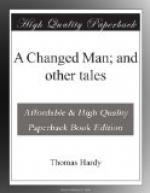It reached his ears that Bellston had not appeared on the evening of his arrival at any hotel in the town or neighbourhood, or entered his wife’s house at all. ‘That’s a part of his cruelty,’ thought Nicholas. And when two or three days had passed, and still no account came to him of Bellston having joined her, he ventured to set out for Froom-Everard.
Christine was so shaken that she was obliged to receive him as she lay on a sofa, beside the square table which was to have borne their evening feast. She fixed her eyes wistfully upon him, and smiled a sad smile.
‘He has not come?’ said Nicholas under his breath.
‘He has not.’
Then Nicholas sat beside her, and they talked on general topics merely like saddened old friends. But they could not keep away the subject of Bellston, their voices dropping as it forced its way in. Christine, no less than Nicholas, knowing her husband’s character, inferred that, having stopped her game, as he would have phrased it, he was taking things leisurely, and, finding nothing very attractive in her limited mode of living, was meaning to return to her only when he had nothing better to do.
The bolt which laid low their hopes had struck so recently that they could hardly look each other in the face when speaking that day. But when a week or two had passed, and all the horizon still remained as vacant of Bellston as before, Nicholas and she could talk of the event with calm wonderment. Why had he come, to go again like this?
And then there set in a period of resigned surmise, during which
So like, so very like, was day to day,
that to tell of one of them is to tell of all. Nicholas would arrive between three and four in the afternoon, a faint trepidation influencing his walk as he neared her door. He would knock; she would always reply in person, having watched for him from the window. Then he would whisper—’He has not come?’
‘He has not,’ she would say.
Nicholas would enter then, and she being ready bonneted, they would walk into the Sallows together as far as to the spot which they had frequently made their place of appointment in their youthful days. A plank bridge, which Bellston had caused to be thrown over the stream during his residence with her in the manor-house, was now again removed, and all was just the same as in Nicholas’s time, when he had been accustomed to wade across on the edge of the cascade and come up to her like a merman from the deep. Here on the felled trunk, which still lay rotting in its old place, they would now sit, gazing at the descending sheet of water, with its never-ending sarcastic hiss at their baffled attempts to make themselves one flesh. Returning to the house they would sit down together to tea, after which, and the confidential chat that accompanied it, he walked home by the declining light. This proceeding became as periodic as an astronomical recurrence. Twice a week he came—all through that winter, all through the spring following, through the summer, through the autumn, the next winter, the next year, and the next, till an appreciable span of human life had passed by. Bellston still tarried.




